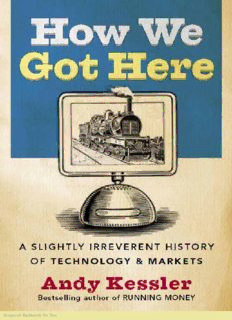
How We Got There A slightly Irreverent History Of Technology And Markets - Andy Kessler PDF
Preview How We Got There A slightly Irreverent History Of Technology And Markets - Andy Kessler
Prepared Exclusively for You ALSO BY ANDY KESSLER Wall Street Meat: Jack Grubman, Frank Quattrone, Mary Meeker, Henry Blodget and me Running Money: Hedge Fund Honchos, Monster Markets and My Hunt for the Big Score Prepared Exclusively for You HHooww WWee GGoott HHeerree AA SSiilliiccoonn VVaalllleeyy aanndd WWaallll SSttrreeeett PPrriimmeerr . A History of Technology And Markets Andy Kessler ESCAPE VELOCITY PRESS Prepared Exclusively for You Copyright © 2004 by Andy Kessler All rights reserved, including the right of reproduction in whole or in part in any form. Printed in the United States of America Author photo by Claudia Marcelloni Adobe Acrobat® Edition produced and distributed courtesy of The Pragmatic Programmers, LLC. Please visit www.PragmaticProgrammer.com for more information on our Pragmatic Bookshelf titles. Escape Velocity Press www.escape-velocity-press.com Printing 10 9 8 7 6 5 4 3 2 Printed edition published by HarperBusiness available from Amazon.com and fine bookstores everywhere. Library of Congress Control Number: Cataloging-in-Publication data is available. ISBN 0-9727832-2-9 Prepared Exclusively for You For my Dad, who sparked my interest in technology Prepared Exclusively for You Table of Contents Foreword 5 Logic and Memory 7 Part 1: The Industrial Revolution 13 Cannons to Steam 15 Textiles 29 Positively Electric 37 Transportation Elasticity, Sea and Rail 43 Part 2: Early Capital Markets 57 Funding British Trade 59 Capital Markets and Bubbles 65 Fool’s Gold 73 Part 3: Components Needed for Computing 87 Communications 89 Power Generation 95 Part 4: Digital Computers 99 Ballistics, Codes and Bombs 101 Transistors and Integrated Circuits Provide Scale 117 Software and Networks 131 GPS 153 Part 5: Modern Capital Markets 159 Modern Gold 161 The Business of Wall Street 165 Insurance 177 The Modern Stock Market 187 Bibliography 203 About the Author 205 Prepared Exclusively for You FFoorreewwoorrdd Talk about twisty-turny paths. I started life as an electrical engineer and ended up running a billion dollar hedge fund on Wall Street. Like a pinball bouncing off of bumpers, I’ve been a chip designer, programmer, Wall Street analyst, investment banker, magazine columnist, venture capitalist, op-ed writer, hedge fund manager and even a book author. My mother thinks I can’t hold a job. Friends suggest I know very little about everything and a lot about nothing. That’s hard to argue with. But throughout it all, I learned over time to live by five simple creeds: 1. Lower prices drive wealth 2. Intelligence moves out to the edge of the network 3. Horizontal beats vertical 4. Capital sloshes around seeking its highest return 5. The military drives commerce and vice versa I’m not entirely sure how I came up with this list, but it has worked. I’ve invested by it and have read and understood the news by it. It has helped explain the unexplainable and has helped me peer into the fog of the future. I sat down with two different groups of people and tried to explain why these creeds are so valuable. The first group, engineering students who lived by math and science, were confused over how technology leads to business, even though advancing technology has driven and continues to drive most everything. The next group, business school students, was Prepared Exclusively for You 6 HOW WE GOT HERE combative; they suggested that business and management skills trump economics. Maybe so. So both groups were equally skeptical, and barraged me with questions like: “How do you know they work?” “How come we’ve never heard of these things?” “Can you prove it?” “What if you’re wrong?” “You’re just making this up, right?” To explain in 20 minutes what took 20 years to seep into my sinews, I’d have to walk them through the history of the computer industry, from the transition from telegraphs to gigabit fiber optic networks and show how we moved from the industrial revolution to an intellectual property economy. And that’s the easy stuff. Add money, and a diatribe turns into a dissertation. I’d have to explain how stock markets came into being, and insurance and the follies of gold standards. And then somewhere in this tale would have to be the link between military doctrine and commerce. I needed to answer a few too many burning questions. What is the history of the computer industry? Of the communications industry? Of the Internet? Why does the U.S. dominate these businesses? Didn’t the British rule the last big cycle? What happened to them? Why do we have money? What is it backed by? What was the gold standard all about? Do we still have a gold standard? How did the stock market come into being and what is it for? Aren’t banks good enough? Who wins – money or ideas? Does the military get its technology from industry or the other way around? Did anything besides Velcro and Tang come out of the Space Program? Why does the U.S. have any industrial businesses left? There are too many questions to answer. So instead, I wrote this primer. Enjoy. Send me feedback, ideas and suggestions at [email protected] with HWGH in the subject. Prepared Exclusively for You
